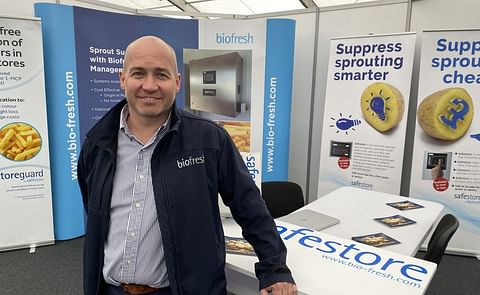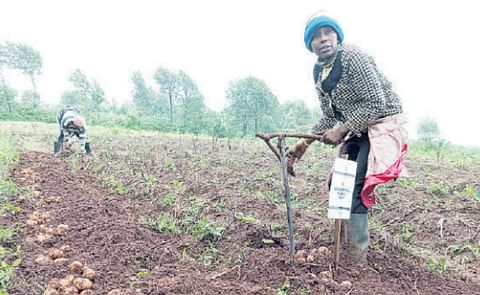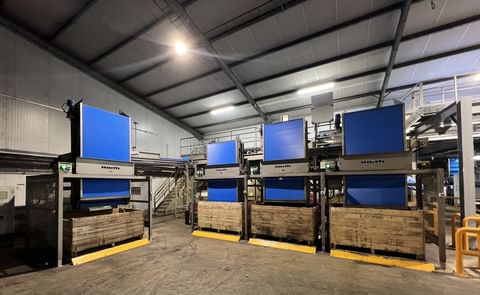Three of Agrico's proprietary potato varieties with a high resistency against Phytophthora infestans: Carolus, Twinner and Alouette
Extreme rainfall triggers first Phytophthora cases in the potato fields in The Netherlands

Every once in a while the potato disease Phytophthora crops up in the Netherlands, and this year is no exception; the first reports have already started trickling in.
Especially potato farmers in the South of the Netherlands are worried.
Christoffel den Herder of Delphy:
Reports of Phytophthora
By now, Twitter is being flooded with reports from farmers who found Phytophthora in their potato plants. It didn't go unnoticed.
Jan van Hoogen, general manager of Agrico:
Persistent rainfall disastrous
Christoffel den Herder continues:
Because you cannot place your hopes in better weather circumstance as an organic cultivator – dry weather can curb further growth of the fungus but never completely remedy it – the consequences for this product group are much more rigorous. Jan van Hoogen:
You cannot fall back on pesticides in the organic cultivation.
Christoffel den Herder:
Resistant potato varieties
Christoffel Den Herder:
Especially potato farmers in the South of the Netherlands are worried.
Christoffel den Herder of Delphy:
“Due to the unseasonable weather conditions with its extreme rainfall this month, you cannot do much against this disease. With organic cultivation you can, at most, hope to avoid an outbreak by starting the cultivation process as early as possible.”
“Or by switching to Phytophthora resistant potato varieties, but then the entire chain needs to cooperate, even more than they do now.”
Reports of Phytophthora
By now, Twitter is being flooded with reports from farmers who found Phytophthora in their potato plants. It didn't go unnoticed.
Jan van Hoogen, general manager of Agrico:
“Our fieldwork employees already established an outbreak of Phytophthora on 14 June. An alert was sent out right away to notify our members, so that they, where possible, could take measures to limit a consequential loss.”Christoffel den Herder, who works as senior advisor organic agriculture for Delphy, says excrescences of this outbreak can mostly be felt in the south of the Netherlands:
“South of Flevoland, where the flowering season just finished, the disease has already reached an advanced stage.”
Persistent rainfall disastrous
Christoffel den Herder continues:
“The weather conditions in recent weeks were not very helpful either.”Phytophthora clings to every plant that is susceptible to it and as the wind blows, any crop that crosses its path.
“You might expect conventional cultivation in whatever circumstances could better withstand Phytophthora than organic cultivation, because of the availability of pesticides, but that is not always the case.”
“Pesticides can only be effective when the weather stays dry for three weeks after using them. In the absence of stable weather the fungus had free reign in the South. You cannot do anything about it. Just as when onions get mildew, the air is full of spores.”
Because you cannot place your hopes in better weather circumstance as an organic cultivator – dry weather can curb further growth of the fungus but never completely remedy it – the consequences for this product group are much more rigorous. Jan van Hoogen:
“Once the potato plant is affected, pretty much your only option is to burn off the green. The potatoes stop growing when you do that, but it is the only way to exterminate the fungus.”Den Herder:
“If the disease is still in an early stage and only the leaves are affected, it might not yet be the end of the story. It is a different story when the fungus enters the ground because of persistent rainfall, it then affects the tubers. Once the tubers are affected, chances are the batch will be very difficult to store after harvesting.”Preventing late blight
You cannot fall back on pesticides in the organic cultivation.
Christoffel den Herder:
“You can therefore at most try to stay ahead of the outbreak by starting the cultivation process as early in the season as possible. Using preventive cultivation measures you can hope your plants have developed as much as possible when Phytophthora arrives.”
“The pressure of the disease increases over time. It is advisable to germinate the potatoes beforehand, to plant them early, and also to regulate manuring well.”
“When potatoes are then planted, they grow much faster, and you could possibly stay ahead of the outbreak as much as possible.”
Resistant potato varieties
Christoffel Den Herder:
“Because hardly any methods exist to combat the disease in organic cultivation, it is necessary to use Phytophthora resistant potato varieties more often,”Jan Van Hoogen agrees:
“Organic growers need those kinds of strains most of all. They are at their wit’s end with each new outbreak, because up till now they were powerless to do anything.”Christoffel Den Herder:
“Agrico is the first party to market a Phytophthora resistant strain to take away that uncertainty. That process started 60 years ago already, so it truly is a long-winded process.”
“And we still can not sit back, because the resistance might be broken. As with antibiotics for medical purposes, the strains of the fungus are continuously changing, and as agriculturalist you end up in a rat race. You have to keep developing.”
“We have the know-how, but the consumer needs to accept the product.”
“By now, cultivators are convinced of this pragmatic approach, but the chain itself is still a bit reserved. Potato varieties, colours and cooking characteristics are unique for each variety, and wholesalers, supermarkets and consumers always have a certain image in mind. It is completely different with onions, to many, an onion is just an onion.”
“People have got so used to potatoes having a specific combination of product characteristics, such as flavour, look, firmness and texture of the skin for example, and Phytophthora resistant varieties cannot always completely facilitate these. Perhaps it is just a matter of time. Besides, new resistant varieties are being developed all the time to fulfill those wishes.”
¿Te gustaría recibir noticias como esta por correo electrónico? ¡Únete y suscríbete!
NEW! Join Our BlueSky ¡Canal para actualizaciones periódicas!
Empresa Destacada
Variedades de papa mencionadas
Contenido Patrocinado
Contenido Patrocinado
Contenido Patrocinado
Contenido Patrocinado
Contenido Patrocinado











